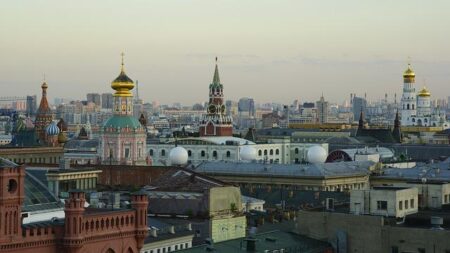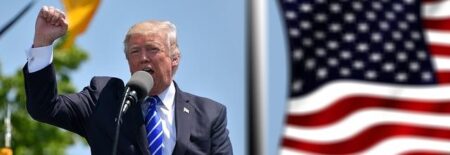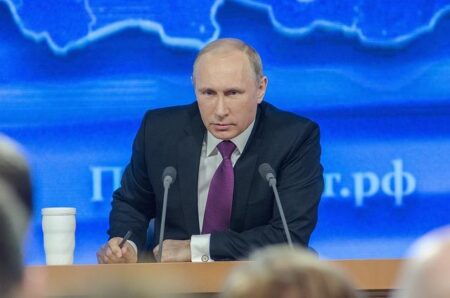Ukrainian President Volodymyr Zelensky has boldly acted on the NSDC’s decision, aligning Ukraine’s sanctions with the UK’s to strengthen their united stand against Russia amid the ongoing conflict, Ukrinform reports
Browsing: foreign policy
Former President Donald Trump has cast a shadow over Ukrainian President Volodymyr Zelensky’s optimistic vision for a peace plan, urging caution as the conflict rages on, The Hill reports. These developments highlight the challenging path that lies ahead
Europe sharply criticized the US after Washington imposed new visa restrictions on several allies, citing concerns over ‘censorship.’ The move has sparked tensions amid ongoing transatlantic disputes, Reuters reports.
The Kremlin has confirmed that US and Russian officials are actively discussing a potential visit by President Putin’s envoy to Miami. These talks aim to strengthen diplomatic channels amid rising tensions, reports –£–ļ—Ä–į—ó–Ĺ—Ā—Ć–ļ–į –Ņ—Ä–į–≤–ī–į
China’s Germany watchers are intently observing Berlin’s recent political shifts, spotlighting a strategic recalibration in Sino-German relations amid growing uncertainties surrounding Europe’s key economic powerhouse, reports Pekingnology
India is boldly redefining its foreign policy to boost strategic autonomy in a dynamic, multipolar world. By expertly navigating ties with global powers, New Delhi is set on expanding its influence while fiercely safeguarding its national interests
A Haaretz report reveals a striking change among young GOP activists: at a Turning Point USA event, 13% of Republicans now view Israel as “not a U.S. ally,” highlighting a notable shift in the party’s next generation
The U.S. Department of State urges calm as tensions rise between Cambodia and Thailand. Both nations are encouraged to open channels of dialogue and pursue peaceful solutions to prevent any escalation in the region
Kyrgyzstan is excited to deepen its connection with Japan, paving the way for dynamic economic partnerships and a surge in investment opportunities. This effort highlights the Manas region’s vital strategic role and fuels broader goals for regional cooperation
Senator Marco Rubio takes a surprising new direction in US-China relations, trading his usual hawkish stance for a more diplomatic tone in a year-end move aimed at easing tensions and paving the way for meaningful dialogue
China is reportedly rolling out a secretive strategy to tighten its grip on Russia, cleverly taking advantage of Moscow’s weaknesses amid rising geopolitical tensions, according to 19FortyFive. This “stealth playbook” signals a daring new chapter in the struggle for regional dominance
Japan and five Central Asian nations made history at their inaugural summit by adopting a powerful joint declaration, setting the stage for enhanced cooperation in economic development, security, and regional stability, The Japan Times reports
A recent Pew Research Center survey reveals a dramatic decline in German public support for the U.S.-Germany relationship, highlighting growing concerns over the political and economic hurdles confronting these longtime allies
The Jerusalem Post spotlights mounting pressure on Australia to retract its recognition of the Palestinian state, sparking urgent concerns about diplomatic consequences and regional stability. This unfolding situation fuels a fiery debate over the future path of Australia’s Middle East policy
Jordan and India are set to deepen their partnership and fast-track economic cooperation, zeroing in on trade, investment, and strategic alliances, reports the Middle East Monitor. Both nations are enthusiastic about broadening collaboration across key sectors to fuel shared growth
Spain’s government faces fierce criticism for strengthening its ties with Nicol√°s Maduro’s regime in Venezuela, igniting a heated debate over diplomatic priorities and human rights amid ongoing political turmoil in Caracas
Former President Donald Trump is charting an ambitious new course toward great power cooperation, emphasizing the vital need to forge strong alliances with China and Russia. This strategy marks a dramatic departure from previous U.S. policies that focused on rivalry and confrontation
China has urged the Netherlands to encourage Nexperia, a top semiconductor company, to visit and engage in open dialogue. This call highlights escalating tensions within the intricate world of global technology and trade, Reuters reports
Russian President Vladimir Putin’s visit to India marks a crucial milestone in strengthening ties between the two nations amid a shifting global landscape. Their discussions focus on energy, defense, and strategic alliances, highlighting India’s growing clout on the world stage
Russian President Vladimir Putin’s visit to India highlights the shifting landscape of global alliances and rising geopolitical tensions, exposing profound concerns in a world rapidly reshaped by economic and strategic changes



















